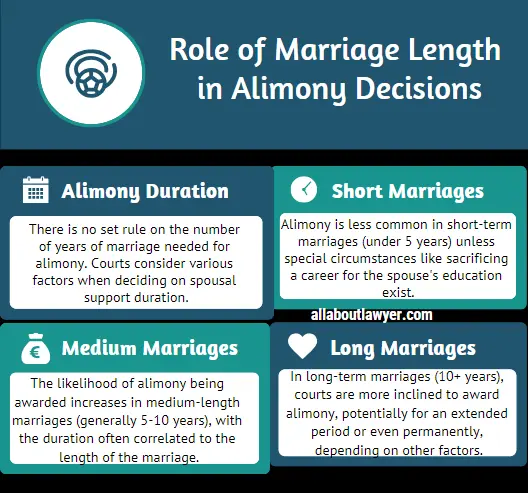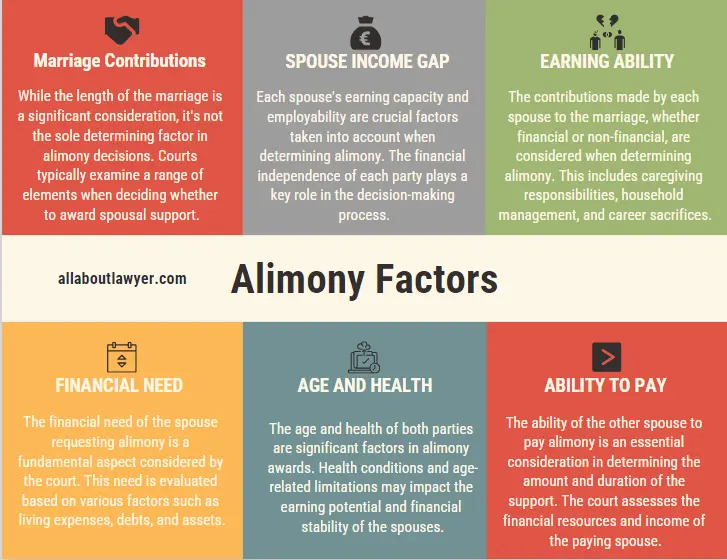How Many Years Do You Have to Be Married to Get Alimony?
When a marriage ends, one of the most pressing concerns for many individuals is the matter of financial support. Alimony, also known as spousal support or spousal maintenance, is a crucial aspect of divorce proceedings that often raises questions about eligibility and duration. One of the most common queries is, “How many years do you have to be married to get alimony?” This article will delve into the intricacies of alimony, exploring the factors that influence its award and the role that marriage length plays in determining eligibility.
Table of Contents
Understand Alimony | Purpose and Types
Before we discuss the marriage duration required for alimony, it’s essential to understand its purpose and the various types that exist. Alimony is designed to provide financial support to a spouse who may be economically disadvantaged after a divorce. Its primary goal is to help maintain a standard of living similar to that experienced during the marriage.
Types of alimony
1. Temporary alimony (also known as pendente lite support)
2. Rehabilitative alimony
3. Permanent alimony
4. Reimbursement alimony
5. Lump-sum alimony
Each type serves a specific purpose and may be awarded based on different circumstances surrounding the divorce and the financial situation of both parties.
Related Articls For You:
How Much Alimony Does A Stay-at-Home Mom Get?
The Role of Marriage Length in Alimony Decisions
Contrary to popular belief, there is no universal rule stipulating a specific number of years of marriage required to qualify for alimony. The duration of the marriage is just one of many factors that courts consider when determining whether to award spousal support and for how long.
In general, the length of the marriage can influence alimony decisions in the following ways:
1. Short-term marriages (typically less than 5 years): Courts are less likely to award alimony in these cases unless there are extenuating circumstances, such as one spouse giving up a career to support the other’s education or professional advancement.
2. Medium-length marriages (generally 5-10 years): The likelihood of alimony being awarded increases, with the duration often correlated to the length of the marriage.
3. Long-term marriages (10+ years): In these cases, courts are more inclined to award alimony, potentially for an extended period or even permanently, depending on other factors.
It’s important to note that these are general guidelines, and actual practices can vary significantly between jurisdictions and individual cases.

Factors Influencing Alimony Awards
While the length of the marriage is a significant consideration, it’s not the sole determining factor in alimony decisions. Courts typically examine a range of elements when deciding whether to award spousal support:
1. Income disparity between spouses
2. Each spouse’s earning capacity and employability
3. Financial need of the requesting spouse
4. Ability of the other spouse to pay
5. Age and health of both parties
6. Contributions to the marriage (both financial and non-financial)
7. Standard of living during the marriage
8. Presence of children and childcare responsibilities
9. Educational level of both spouses
10. Any marital misconduct or abuse
11. Custody arrangements for minor children
12. Fault in the marriage (in some states)
These factors are weighed collectively to determine not only if alimony should be awarded but also the amount and duration of the support.

State Laws and Alimony Guidelines
It’s crucial to understand that alimony laws can vary significantly from state to state. Some states have specific guidelines or formulas for calculating alimony based on the length of the marriage, while others leave more discretion to the judges.
For example:
California Alimony
– In California, marriages lasting less than 10 years are generally considered “short-term,” and alimony typically lasts for half the length of the marriage. Marriages lasting 10 years or more are considered “long-term,” and alimony may be awarded for an indefinite period.
Texas Alimony
– Texas requires a marriage to have lasted at least 10 years before a spouse can be eligible for alimony, with rare exceptions.
Florida Alimony
– Florida categorizes marriages as short-term (less than 7 years), moderate-term (7 to 17 years), and long-term (more than 17 years). Alimony awards are more likely in moderate and long-term marriages.
These examples highlight the importance of consulting with a local attorney familiar with your state’s specific laws and practices regarding alimony.
The Shift Towards Rehabilitative Alimony
In recent years, there has been a trend in many jurisdictions towards favoring rehabilitative alimony over permanent support. This shift reflects changing societal views on gender roles and financial independence. Rehabilitative alimony is designed to provide temporary support to allow the recipient spouse to gain education, training, or work experience necessary to become self-sufficient.
This trend means that even in cases of long-term marriages, courts may be more inclined to award alimony for a limited period rather than indefinitely. The goal is to provide a financial bridge to self-sufficiency rather than a lifelong entitlement.
Negotiating Alimony Outside of Court
It’s worth noting that many divorce cases are settled out of court, with couples negotiating the terms of their separation, including alimony arrangements. In these situations, the length of the marriage may play a role in negotiations, but couples have more flexibility to come to mutually agreeable terms that may not strictly adhere to what a court might decide.
Mediation and collaborative divorce processes can be effective ways for couples to address alimony issues, taking into account their unique circumstances and future goals.
The Impact of Prenuptial and Postnuptial Agreements
Prenuptial and postnuptial agreements can significantly impact alimony decisions, potentially overriding considerations of marriage length. These agreements allow couples to predetermine alimony terms, including whether it will be paid, how much, and for how long.
If a valid prenuptial or postnuptial agreement exists, courts will generally honor its terms regarding alimony, regardless of the marriage’s duration. However, these agreements must meet certain legal requirements to be enforceable, and courts may scrutinize them for fairness, especially in cases of long-term marriages.
Modification and Termination of Alimony
Once alimony is awarded, it’s not necessarily set in stone. Changes in circumstances can lead to modifications or termination of spousal support. Common reasons for alimony modification include:
– Significant changes in either party’s income
– Remarriage of the recipient spouse
– Cohabitation of the recipient spouse with a new partner
– Retirement of the paying spouse
– Health issues affecting earning capacity
The ability to modify alimony often depends on the type of alimony awarded and the specific terms of the divorce settlement or court order.
Conclusion
In conclusion, while the duration of a marriage is an important factor in determining alimony, there is no fixed number of years that guarantees eligibility. Courts consider a complex interplay of factors, including but not limited to marriage length, when making alimony decisions. The trend towards rehabilitative alimony, variations in state laws, and the increasing use of prenuptial agreements all contribute to the complexity of this issue.
If you’re facing a divorce and have concerns about alimony, it’s crucial to consult with an experienced family law attorney who can provide guidance based on your specific situation and the laws of your jurisdiction. Remember that each case is unique, and the outcome will depend on your individual circumstances.
Related Articls For You:
Bridge The Gap Alimony Florida
Is Alimony Taxable in Ohio?
FAQs
1. Is there a minimum number of years of marriage required for alimony?
There is no universal minimum number of years required for alimony eligibility. Requirements vary by state and individual circumstances.
2. Can I get alimony if I was married for less than a year?
While it’s less common, alimony may be awarded in very short marriages if there are compelling circumstances, such as one spouse giving up a career to support the other.
3. Does cheating affect alimony decisions?
In some states, marital misconduct can influence alimony decisions. However, many states now use a no-fault approach where infidelity doesn’t directly impact alimony.
4. Can men receive alimony?
Yes, alimony is gender-neutral. Any spouse who meets the criteria can potentially receive alimony, regardless of gender.
5. How long does alimony typically last?
The duration of alimony varies widely depending on the type awarded, length of marriage, and individual circumstances. It can range from a few months to several years, or in some cases, be permanent.
6. Can alimony be avoided with a prenuptial agreement?
A well-drafted prenuptial agreement can often limit or eliminate alimony obligations, provided it meets legal requirements and is deemed fair by the court.
7. What happens to alimony if the recipient remarries?
In most cases, alimony terminates automatically upon the remarriage of the recipient spouse, unless the divorce agreement specifies otherwise.
8. Can I still get alimony if I’m living with a new partner but not married?
Cohabitation with a new partner can affect alimony in many jurisdictions, potentially leading to reduction or termination of payments, depending on state laws and the specific circumstances.
About the Author

Sarah Klein, JD, is a former family law attorney with over a decade of courtroom and mediation experience. She has represented clients in divorce, custody cases, adoption, Alimony, and domestic violence cases across multiple U.S. jurisdictions.
At All About Lawyer, Sarah now uses her deep legal background to create easy-to-understand guides that help families navigate the legal system with clarity and confidence.
Every article is based on her real-world legal experience and reviewed to reflect current laws.
Read more about Sarah
